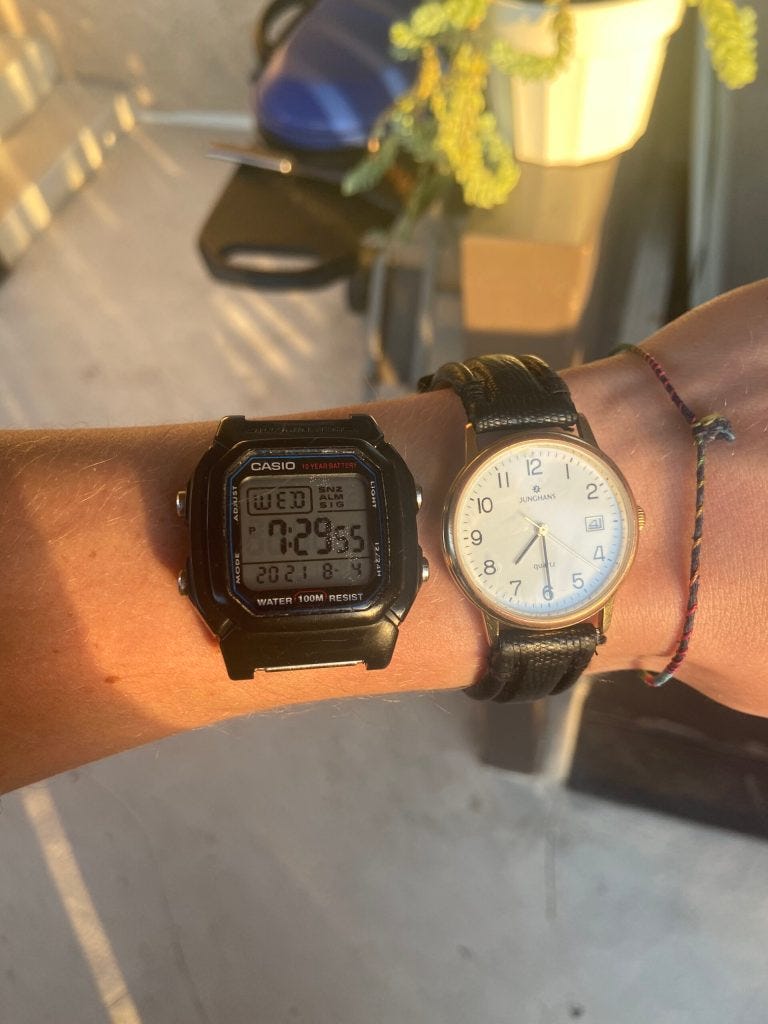48 Hours in Switzerland + Being Understood by Foreigners
Interlaken, Switzerland, July 2019
On my first night in Interlaken, I met an American named Josh. We went hiking, and he told me his war stories from Iraq. At the time, Josh was writing a memoir, and I wanted to read the finished story. However, I failed to ask Josh for his contact information, and I never heard from him or his book again. That was lesson number one from my trip to Switzerland— do not miss the chance to stay in contact with interesting people. The rest of this post will describe the other lessons learned during 48 hours in Switzerland.
Lesson one: Don't be afraid to ask people for their contact information
When we got back into the hostel, I saw a young man who looked like me reading on a Kindle. After some pleasantries, he offered me his extra dinner, and we got to know each other. Soon the room filled up with Korean students and my new friend, who had already been there a couple of nights, was like the local celebrity. Anyways, I was planning on waking up early to hike the Hardergrat ridge, so I politely excused myself and, on the way out, caught myself thinking, "What a douche that guy was." In hindsight, I was probably just jealous he spoke good German and got all the attention from the cute Korean girls.
Lesson two: When you don't like someone, it usually says more about you than them.
The morning overcast prevented me from hiking the dangerous Hardergrat, so I went for a long walk around town and jumped into the crystal clear yet freezing cold river instead. When I got back to the hostel, I saw the social butterfly reading away on his kindle again. He told me he was using the rainy day to drive up to Lucerne and explore the historical city. Without any plans myself, I asked if I could tag along, and 15 minutes later, we were in his stick shift Volkswagen headed north.
Lesson three: Buy a Kindle = read more
Lesson four: Rain is only a problem for the unadaptable
Lesson five: It doesn't hurt to ask
Almost immediately after we entered the car, something was off. This allegedly "Dutch" guy who had spoke with an American accent in the hostel lobby suddenly sounded like a mix between Harry Potter and Conor McGregor. So I asked him why he was now speaking with "Received Pronunciation," a high-brow way to say British English. He aggressively insisted he wasn't, and after a couple more questions, he admitted that his father was Irish-born, and he put on the "standard" American accent to be understood by non-native speakers.
Lesson six: Don't try to wow people with fancy words
Lesson seven: Be adaptable with your speech, especially around non-native speakers
On the way to Lucerne, we talked about watches. Since college, I have been wearing a watch, and it helps me be less distracted by my phone. The Irish-Dutch guy, who also wore a watch, told me how in his culture, a man receives a nice timepiece at graduation or when starting their career to affirm the transition into manhood. That got me thinking, "How do I know when I have become a man?" So there I was at 19 years old, traveling through Europe alone, still unsure if I was a man or not.
Lesson eight: Rituals and traditions help us clearly differentiate between life phases
In Lucerne, we were shocked by the abundance of Chinese faces and characters plastered on the windows of Swiss watch shops. Also, although it was Sunday and nearly all other shops were closed, as is the tradition in German-speaking countries, some watch shops were still open catering to Chinese tourists. The same dynamic was visibly evident in Interlaken.
Lesson nine: The Chinese consumer will massively impact the 21st century
Lesson ten: Learn Chinese now
We entered a church, and I gestured the sign of the cross out of habit. My atheist travel buddy thought that was medieval of me, and I could sense his distaste. However, a Chinese tourist observed me and hurriedly did the same as she entered the house of worship. She struck me as respectful, while my travel buddy struck me as intolerant. If I were to go to China, I would follow her example and observe how they act to show respect.
Lesson eleven: Do not mock other people's traditions
Lesson twelve: Use social proof in foreign environments (Do as the Roman's do)
After the church, we searched Google Maps and found a cafe that was open on Sunday. The Irish-Dutch guy ordered first, and then it was my turn. Swiss German and German German are often entirely different, but I felt confident enough. I gave my line, "Ich hätte gerne ein Cappucino, bitte" (I'll have a Cappucino, please) and waited on edge. Finally, she replied with a question which was a problem because I understood nothing of her thick Swiss accent. My gut told me to say, "für hier" (for here), but I froze. A moment later, she hit me with the dreaded "Do you speak English, honey?—for here or to go?" At that moment, I felt like a massive failure and as if all the eyes of the quaint cafe were on me—In reality, probably no one but the Irish-Dutch guy noticed.
Lesson thirteen: Have an action bias
Lesson fourteen: Trust your gut
I walked over to my Dutch friend, head down, shoulders slumped, and he asked me where I got tripped up. As we were drinking our coffee, he told me how his Irish dad never became truly fluent in Dutch even after decades in the country, which further crushed my self-confidence. Until we left the cafe, I felt discomfort over my linguistic failure. Luckily, however, I was not destined to be like his father and am now quite confident speaking German.
Lesson fifteen: You are not condemed to repeat the failures of those who came before you
My memory of the rest of our time in Lucerne is not strong, and I do not even remember the Dutch guy's name, probably because he outshined me in many ways, and I felt jealous of him. In any case, I often think back to those couple of days in Switzerland and what I learned.
The Return (返回)
Recently, I have been thinking about what it means to wear a watch and decided to retire the 10 dollar plastic Casio I have been wearing for the past three years because that phase of my life is over. Now I have been wearing a leather one I bought at a fleemarket on Hermann-Ehlers-Platz in Berlin. In a decade or so, I look forward to returning to Lucerne and buying a Patek Phillippe wristwatch—in Mandarin Chinese, of course.
Bonus: How to Be Understood by Foreigners
The Irish-Dutch kid who used an American accent with English learners and his natural Irish accent for English native speakers showed me you could have multiple ways of applying the same language. Actually, we all do this every day. For example, The way you talk to your classmates is different from your professor, and the way you talk to your girlfriend is different from your mother. Building on that, how you speak to an English learner should not be the same way you speak to an English native speaker.
Here are some principles to help make sure English learners understand you. (These principles apply for learners of all languages)
Talk Slowly
Use the most Common Words and phrases
Bad: its a pleasure to meet you
Good: It's nice to meet you
Bad: How have you been?
Good: How are you?
Bad: What are you up to?
Good: What are you doing?
Avoid Slang
Bad: I'm gonna, I'm tryna
Good: I am going to, I want to
Get used to what most English learners can answer
What do you like?
What do you like to do?
What do you want?
What are you studying?
What do you do for work?
Why are you learning English?
Developing your "non-native speaker" technique helps us be understood. Obviously, many non-native speakers speak English at a high level, but this is still a good jumping-off point. Also, manipulating your speech is a skill that can add lots of excitement to your life. When I am looking for some novelty, I sometimes begin conversations with strangers in a German accent before returning to my normal voice. I recommend this game to you too. It is an easy way to break the ice.








